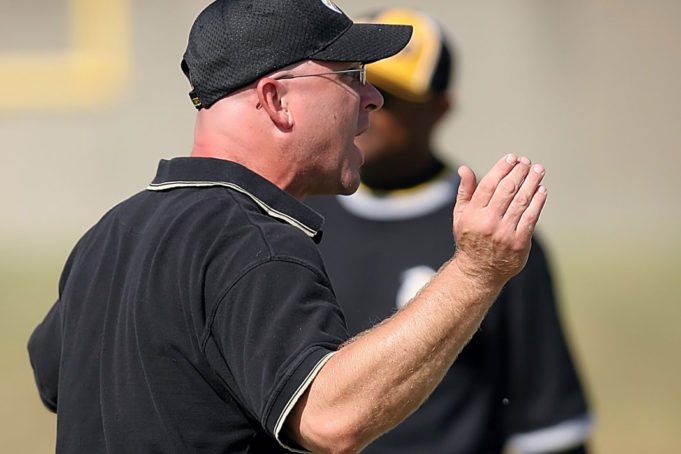Referees frequently talk about how much coaches yell at them. We’d all like to have them yell less. Yelling at referees rarely improves performance. In fact, just the opposite is more likely. Of course, there are some coaches who never yell. Some coaches yell only at their own players, criticizing mistakes, telling them what to do next or, occasionally, praising good play. Some coaches yell instructions continually and others will only comment periodically. And some coaches will yell at referees in much the same way.
Coach yelling can take the form of criticizing (“How could she be offside, ref?”), telling us what to do next (“Handball, ref, handball! You gotta call that, ref!”) and praising good decisions (“It’s about time!”). Many of us turn a deaf ear to all of these, particularly when a coach yells continuously.
Sometimes, however, the coach yelling isn’t necessarily criticism of us, even though it may sound like it. When play is far from the benches, coaches yell because they may feel that they have to yell in order simply to be heard. The volume of their voice doesn’t mean that what they are saying is criticism. But “What’s the call, ref?” can sound like that when yelled from 80 yards away.
The fact is that coaches do not watch the game as closely as referees do. Maybe they have to deal with an injured player, discuss what’s happening with an assistant coach, talk to a substitute about what they want them to do, reassure a substituted player that they were playing well, etc. As a result, they sometimes miss what happened on the court or field.
They want to ask the referee what happened. Referees need to listen to what coaches are saying with a third ear. What does that mean? “What’s the call, ref?” may, in fact, just be a simple question — even if it is asked with a lot of volume. Until the coach shows otherwise, we should assume that the coach just wants us to communicate with them. Coaches and referees are the adults out there. Neither group should assume that the other one is an incompetent, malevolent or arrogant power tripper, unless events show that to be true.
Occasionally, even a coach’s seeming criticism of the referee’s decisions is not really criticism. For example, let’s say a very experienced coach seems to be criticizing your tolerating something borderline by the opposing team. But if his team should be winning easily and they aren’t, those comments could really just be an attempt to inspire a better performance from his players and not directed at you at all. “I guess we’re playing against 12 today, fire up!”
That may be happening when the coach’s level of criticism is out-of-proportion to the events on the field.
Even though the coach is really not criticizing the referee, the referee still has to take action. Everyone else may not realize the true motives for the coach’s comments. When the coach’s comments are over the top, the referee has to deal with them. One technique is “Ask, Caution, Dismiss.” Be collegial on the first incident. Try standing side-by-side with the coach and find out what the issue really is. But don’t just ignore it. The problem won’t get better on its own. If the behavior continues, an early caution will give you a lot of information and separate the purely manipulative coach who will most likely back down, from those who really have lost it. Once you know that, punative action will be your next course of action should the behavior remain a problem.
What's Your Call? Leave a Comment:
Note: This article is archival in nature. Rules, interpretations, mechanics, philosophies and other information may or may not be correct for the current year.
This article is the copyright of ©Referee Enterprises, Inc., and may not be republished in whole or in part online, in print or in any capacity without expressed written permission from Referee. The article is made available for educational use by individuals.

















